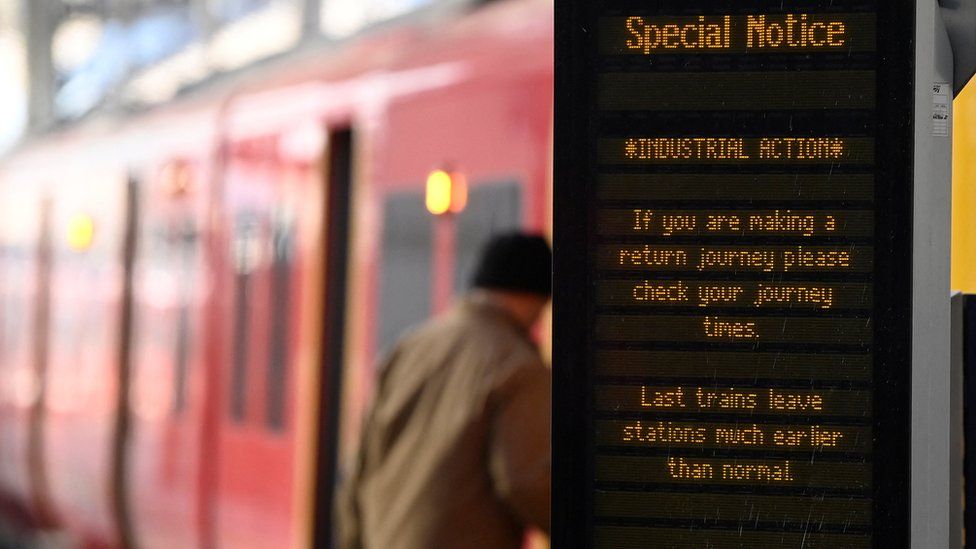
Rail strikes are expected to disrupt family holiday travel as many schools across England and Wales break up for the six-week summer holidays.
Members of two rail unions are currently involved in industrial action at train operating companies. The action is part of their ongoing dispute about pay and conditions.
When are the next strikes and which lines will be affected?
Strikes will be held on Saturday 22 July and Saturday 29 July.
Members of the RMT union will be taking action at 14 rail companies:
- Avanti West Coast
- C2C
- Chiltern Railways
- CrossCountry
- East Midlands Railway
- GTR
- Great Western Railway
- Greater Anglia
- LNER
- Northern Trains
- Southeastern
- South Western Railway
- TransPennine Express
- West Midlands Trains
GTR operates Southern, Thameslink, Great Northern and Gatwick Express.
Greater Anglia includes Stansted Express.
Will some trains still run on strike days?
The RMT says 20,000 of its members, including guards, train managers and station staff, will walk out.
On previous strike days there have been thousands of cancellations, with some lines not operating at all.
On lines where there have been services, they have tended to start later and finish earlier than normal.
National Rail has said passengers should expect large areas of the rail network to have little or no services and should check with the operator before travelling.
What action are train drivers taking?
Members of Aslef are taking industrial action short of a strike, in the form of an overtime ban.
Most train companies rely on drivers working overtime to run their full schedules.
Saturday 22 July marks the last day of one overtime ban, but services will be disrupted again from Monday 31 July to Saturday 5 August.
Many train operators will reduce their service levels.
Why have railway workers been on strike?
But the rail industry is under pressure to save money, after the pandemic left a hole in its finances.
Bosses say reforms need to be agreed to afford pay increases and modernise the railway.
What about Tube strikes?
Three unions had been due to walk out in a long-running dispute about pensions, job cuts and working conditions.
How much are rail workers paid?
If drivers are excluded (because they tend to be members of the Aslef union, not RMT) its estimate is £39,518. However, the RMT union said that figure was too high because it does not include rail cleaning staff.
The ONS says median pay for “train and tram drivers” is just under £59,000.
Although Aslef members tend to be better paid than other rail workers, Mick Whelan, general secretary of the union, told BBC News on 12 May that train drivers “haven’t had a pay rise for four years”. He was just referring to the ones who are taking industrial action.
That’s because a new pay deal has not been reached since their last agreement ended in 2019.
However, Transport Minister Huw Merriman said the pay of train drivers “has gone up by 39% since 2011… the highest increase of any employment group.”
He is right about the 39% increase, but we have not been able to establish whether it’s the highest increase for any employment group. That’s because of changes to the way the figures have been released over the last decade.
What deal have rail workers been offered?
The Rail Delivery Group (RDG), which represents the 14 train companies, made an offer that would have seen rail workers receive a backdated pay rise of 5% for 2022. It would then negotiate reforms ahead of a second year’s pay rise with individual operators.
On 5 May, RMT members voted to extend the strike mandate for another six months.
The Aslef union, meanwhile, has rejected a two-year offer which would see drivers get a backdated pay rise of 4% for 2022 and a 4% increase this year.
The union said the offer amounted to an uplift on salaries of between 14.4% for the lowest paid grades to 9.2% for the highest paid.
How much notice do unions have to give?
Unions are obliged to give at least 14 days’ notice of any strike action.
How will the rail strikes affect your journey? What alternative forms of transport are you using? Share your experiences by emailing [email protected].
Please include a contact number if you are willing to speak to a BBC journalist. You can also get in touch in the following ways:
If you are reading this page and can’t see the form you will need to visit the mobile version of the BBC website to submit your question or comment or you can email us at [email protected]. Please include your name, age and location with any submission.